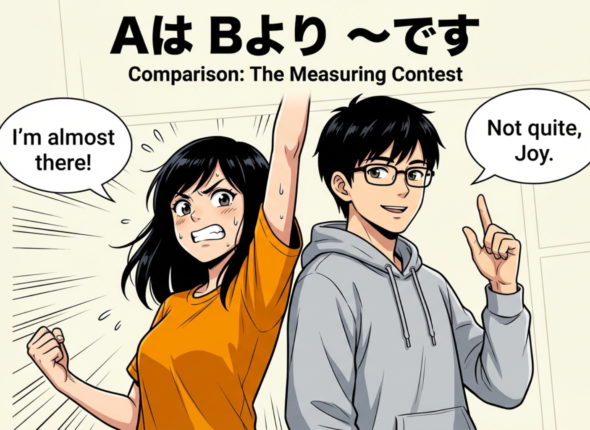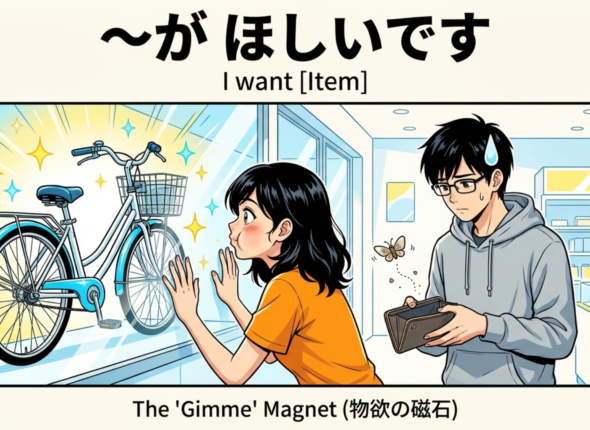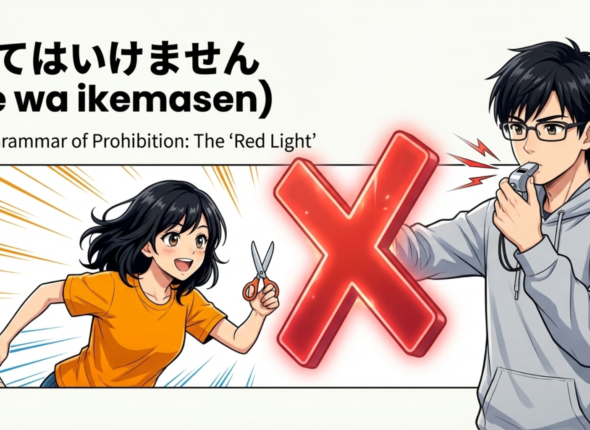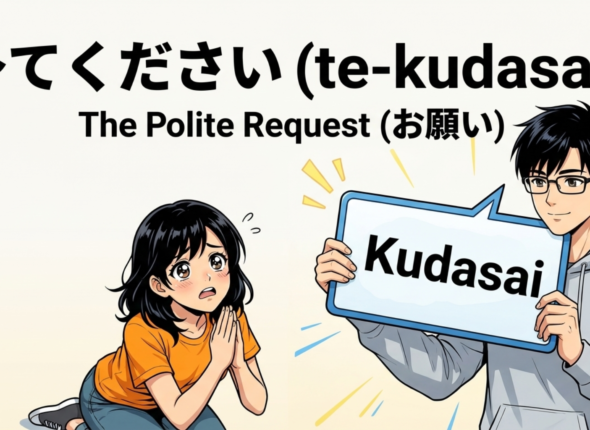Blog
【使い分け】「〜たほうがいい」と「〜べきだ」の違い[日本語学習]
優しくアドバイスするJoy [たほうがいい] vs. 厳しくルールを言うJoy [べきだ]) 「もう帰るべきだ!」 英語の “Should” はとても便利ですが、日本語では使い分けが必要です。「〜たほうがいい (Ta hou ga ii)」はアドバイス、「〜べきだ (Beki da)」は義務です。これを間違えると、とても厳しい先生のように聞こえてしまいます。JoyとKenと一緒にニュアンスを学びましょう! 🗣 会話シーン (Conversation Scene) Kenは風邪をひいていて、咳(せき)をしています。 Joy ケンさん、顔色(かおいろ)が悪(わる)いですよ。 今日はもう、帰(かえ)ったほうがいい ですよ。 (Ken, you look pale. You “should / bad...
The Difference between「〜たほうがいい」と「〜べきだ」の違い|Japanese Grammar (N5–N3)
(Joy giving advice [Ta hou ga ii] vs. Joy enforcing rules [Beki da]) “You should go home.” In English, “should” is used for everything. In Japanese, we have 〜たほうがいい (Ta hou ga...
GrammarBook N5: ~ほど~ない (Not as… as…)
N5-G-036 ~ほど~ない (Not as… as…) Peripheral / Comparison 👀 Layer A: Visual Guide (直感理解) 📝 Quick Summary (まとめ) 「AはBより~だ」の逆(ぎゃく)のパターンです。「AはBのレベルまでは届(とど)かない」という意味で、「AはBほど~ない」と言います。 Use this pattern to say “A is not as [Adjective] as B”. It...
GrammarBook N5: Aが いちばん ~です (The most / The best)
N5-G-035 Aが いちばん ~です (The most / The best) Supporting / Adjectives 👀 Layer A: Visual Guide (直感理解) 📝 Quick Summary (まとめ) グループの中で「No.1」を決める表現(最上級)です。「~の中で、Aが一番(最も)~だ」と言いたいときに使います。 Use this pattern to express the superlative (“The most…”,...
GrammarBook N5: Aは Bより ~です (Comparison)
N5-G-034 Aは Bより ~です (Comparison) Supporting / Adjectives 👀 Layer A: Visual Guide (直感理解) 📝 Quick Summary (まとめ) 2つのものを比(くら)べる表現です。「Aは Bよりもっと~だ」と言いたいときに使います。「より」は比較の基準(きじゅん)を表します。 Use this pattern to compare two items. “A is more [Adjective] than...
GrammarBook N5: ~ましょうか (Shall I…?)
N5-G-033 ~ましょうか (Shall I…?) Supporting / Offer 👀 Layer A: Visual Guide (直感理解) 📝 Quick Summary (まとめ) 「何か手伝いましょうか?(申し出)」または「どうしましょうか?(相談)」という2つの意味があります。 Use this pattern to offer help (“Shall I…?”) or to consult with someone (“Shall...
GrammarBook N5: ~ませんか
N5-G-032 ~ませんか (Won’t you?) Core / Invitation 👀 Layer A: Visual Guide (直感理解) 📝 Quick Summary (まとめ) 相手(あいて)を丁寧(ていねい)に誘(さそ)う表現です。「~ましょう」よりも相手の都合(つごう)を配慮(はいりょ)した、「もしよかったら~しませんか?」というニュアンスです。 This is a polite way to invite someone (“Won’t you…?”). It is more polite...
GrammarBook N5: ~ましょう
N5-G-031 ~ましょう (Let’s do) Core / Suggestion 👀 Layer A: Visual Guide (直感理解) 📝 Quick Summary (まとめ) 「一緒に~しよう」と誘(さそ)ったり、提案(ていあん)したりするときに使います。英語の “Let’s” に近いです。 Use this pattern to make a suggestion or invitation (“Let’s do…”). It...
GrammarBook N5: ~ことができます (The ‘Can Do’ Badge)
N5-G-030 ~ことができます (Potential / Can do) Supporting / Potential 👀 Layer A: Visual Guide (直感理解) 📝 Quick Summary (まとめ) 「能力(のうりょく)」や「可能性(かのうせい)」を表す表現です。「~する能力がある」「~することが可能だ」と言いたいときに使います。 Use this pattern to express ability or possibility (“I can do…”). You...
【使い分け】「〜と思う」と「〜と感じる」の違い[日本語学習]
(論理的に考えるJoy [思う] vs. 感覚で受け取るJoy [感じる]) 「高いと思う」。 「寒さを感じる」。 日本語では、思考(Thoughts)と感覚(Senses)をはっきり区別します。頭(Head)で使う「〜と思う」と、心や体(Heart/Body)で使う「〜と感じる」。JoyとKenと一緒に違いを学びましょう! 🗣 会話シーン (Conversation Scene) JoyとKenが、とても古い日本の家に入りました。 Joy うわあ…なんだか、歴史(れきし)を 感(かん)じます ね。 ちょっと不思議(ふしぎ)な雰囲気(ふんいき)です。 (Wow… somehow, I “feel/sense” the history. It has a slightly mysterious atmosphere.) Ken そうですね。ここは100年前に建てられたそうです。...
The Difference between「〜と思う」と「〜と感じる」の違い|Japanese Grammar (N5–N3)
(Joy thinking with logic [Omou] vs. Joy feeling with senses [Kanjiru]) “I think it’s expensive.” “I feel cold.” In Japanese, we separate thoughts from sensations. 〜と思う (To omou) is for the head....
GrammarBook N5: Nがほしいです
N5-G-029 Nが ほしいです (I want [Thing]) Supporting / Adjectives 👀 Layer A: Visual Guide (直感理解) 📝 Quick Summary (まとめ) 「物(もの)が欲しい」ときに使います。「~たい」は動作(アクション)に使い、「ほしい」は物(アイテム)に使います。 Use “Hoshii” when you want a tangible OBJECT or thing. (Use “Tai”...
GrammarBook N5: ~たいです
N5-G-028 ~たいです (I want to…) Supporting / Adjectives 👀 Layer A: Visual Guide (直感理解) 📝 Quick Summary (まとめ) 「何かをしたい(願望)」という気持ちを伝える表現です。 作り方は簡単。「ます形」の「ます」を取って、「たい」を付けます。 Use this pattern to express what you WANT to do. Remove “masu”...
GrammarBook N5: Nがすき / きらい (Like / Dislike)
N5-G-027 Nが 好き / 嫌い (Likes & Dislikes) Supporting / Adjectives 👀 Layer A: Visual Guide (直感理解) 📝 Quick Summary (まとめ) 自分の好(この)みを伝える表現です。「好き」と「嫌い」は形容詞(けいようし)なので、対象(たいしょう)には「が」を使います。 Use this pattern to express likes and dislikes. Since “Suki”...
GrammarBook N5: ~て (Connecting Sentences)
N5-G-026 ~て (Sequence of Actions) Supporting / Te-form 👀 Layer A: Visual Guide (直感理解) 📝 Quick Summary (まとめ) 複数の動作(どうさ)を順番(じゅんばん)に言うときに使います。「~して、~して、~します」のように文をつなぐ「接着剤(せっちゃくざい)」の役割をします。 The “Te-form” acts as a conjunction (like “and”) to connect multiple actions in...
GrammarBook N5: ~てはいけません
N5-G-025 ~てはいけません (Prohibition) Supporting / Te-form 👀 Layer A: Visual Guide (直感理解) 📝 Quick Summary (まとめ) 「禁止(きんし)」を表す強い表現です。「~してはいけない」「~してはだめだ」とルールを伝えるときに使います。 Use this pattern to express a prohibition or a rule (“You must not…”). It is...
GrammarBook N5: ~てもいいです
N5-G-024 ~てもいいです (Permission) Supporting / Te-form 👀 Layer A: Visual Guide (直感理解) 📝 Quick Summary (まとめ) 「許可(きょか)」を求めたり、与(あた)えたりする表現です。「~しても大丈夫(だいじょうぶ)ですか?」と聞くときに使います。 Use this pattern to ask for permission (“May I…?”) or to give permission (“You may…”)....
GrammarBook N5: ~ています (Progressive State / Action)
N5-G-023 ~ています (Continuous Action / State) Supporting / Te-form 👀 Layer A: Visual Guide (直感理解) 📝 Quick Summary (まとめ) 「今(いま)、~している(進行中)」を表す形です。また、「結婚(けっこん)している」や「知(し)っている」のような「状態(じょうたい)の継続(けいぞく)」も表します。 This form expresses two things: 1) Actions happening RIGHT NOW (Present Continuous),...
GrammarBook N5: ~てください (The Polite Request)
N5-G-022 ~てください (Please do) Core / Requests 👀 Layer A: Visual Guide (直感理解) 📝 Quick Summary (まとめ) 相手(あいて)に何かをお願(ねが)いするときに使います。「~してください」は丁寧(ていねい)な指示(しじ)や依頼(いらい)です。 Use this pattern to make polite requests or give instructions. You must conjugate the...
GrammarBook N5: な-adjectives
N5-G-021 な-Adjectives (Present & Negative) Supporting / Adjectives 👀 Layer A: Visual Guide (直感理解) 📝 Quick Summary (まとめ) 「な形容詞」は、文法的には「名詞(めいし)」と同じグループです。 否定形(ひていけい)は、名詞と同じように「~じゃありません」を使います。 Na-Adjectives behave almost exactly like Nouns. To make them negative, add “ja...


















